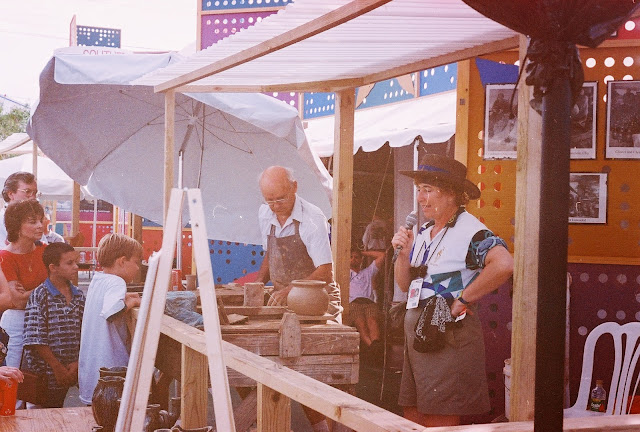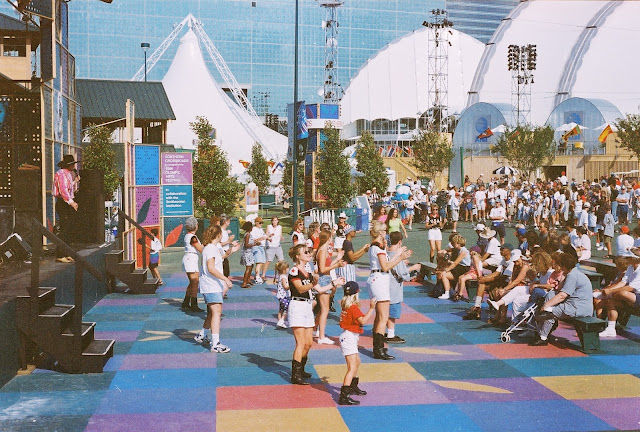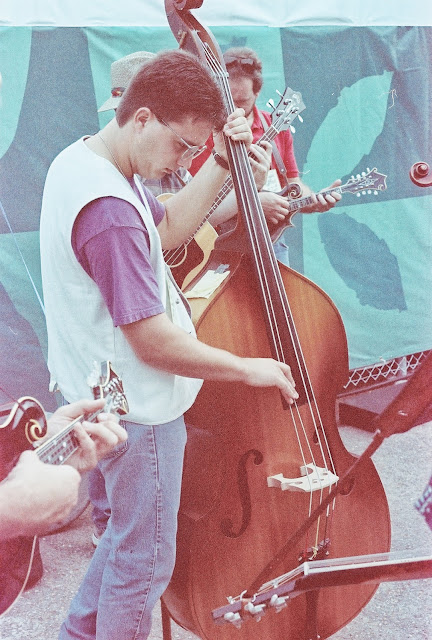
Valley Hymns, Blue Ridge Breakdowns and Tidewater Harmonizers: Vernacular Life and Lore in the Post-Modern Upland South and Mid-Atlantic Regions.
Tuesday, August 13, 2013
Monday, August 12, 2013
Ross Brown

 (above: fieldwork excerpt videoed at Ross Brown's home in Hiwassie, GA, by D. Day.)
(above: fieldwork excerpt videoed at Ross Brown's home in Hiwassie, GA, by D. Day.)from "Mountain Valley Music:"
Ross Brown, fiddle, accompanied by Don
Fox on guitar. "Snowbird," "General
Lee's Surrender," and "Sweet
Marie." Recorded at the Campbell Folk School,
2117/90.
Ross Brown was born in Townes County,
Georgia in 1909. His dad had a hundred-acre apple orchard in
Hiawassee. He had four sisters who sang and played piano, and
remembers them singing parlor songs and hymns. Ross began playing
fiddle at the age of 12. His first and most important mentor was an
itinerant blind fiddler named Uncle Joe Swanson:
"Uncle Joe Swanson, he was a blind
fiddler. He lived with his sister and brother-in-law. He would go all
over the country and spend the night with you. He'd stay with you a
week at a time and playa fiddle. 'Course, in that time we had one of
those old pump organs, and there was always somebody in the family or
in the settlement that was good on-organ. And he'd tune up to that
organ, and he would play ... oh, he'd play 'til two or three o'clock
in the morning. He played, oh I'd say, over a hundred tunes. I've
never heard another fiddler ever touch him, by the way. I learned
alot of 'em (tunes) from him ... "
In the old days, "your main band"
was a fiddle and "an old banjo with a groundhog head." Ross
remembers that the first guitar in Townes County was tuned in an open
G chord like an banjo. This alternate guitar tuning is also known as
"Sebastopol" or "Spanish" tuning, and is a
holdover from when the guitar was a parlor instrument. Many Black
guitarists (including local musician Hardy Fain, now over 90 and in a
rest home in Andrews) played "John Henry" in this tuning,
chording the strings with a knife.
Ross's main opportunities to play were
"get-togethers" and square dances: "I played for no
telling how many candy-bakings and candy-pullings. A candy-pulling,
you know, you took that old homemade syrup, and boiled it until it
got real thick, and then you'd let it cool, and then you'd go to
pulling it. It'd turn yellowish-white. And then when it got cold it'd
break just like stick candy ... [I've played for] hundreds and
hundreds of square dances ... [They'd] start in long up in the fall,
have one in somebody's home, then next week in somebody else's ...You
didn't go unless you were invited I've been to where they danced 'til
midnight and then had a chicken supper and sat around awhile, and
started dancing 'til the chickens were getting off the roost the next
morning ... [Dancing was] about the only pastime we had back in them
days."
Once he married, Ross quit making music
altogether for several years, concentrating instead on raising and
supporting a family by working "plumbing and electric." In
the mid-'60's, he started up playing again in earnest, helping to
found the Georgia Mountain Fair with the likes of Fiddling Howard
Cunningham and the Eller Brothers. He has since played at the
Smithsonian Folklife Festival on the Mall in Washington, at Berea
College, at the National Folk Festival at Wolf Trap, at Mountain
Heritage Day at Western Carolina, at the Hunter Museum in
Chattanooga, and at the Campbell Folk School. He has recorded several
records, providing fiddle accompaniment for friends such as Jim
Southern and the Southern Sounds. Perhaps his best record is Goin'
Back to Georgia, with the Eller Brothers on Flyright Records. On this
album, the late Eller Brothers and Ross Brown performed what can
beconsidered genuine north Georgia old-time dance music of the kind
that Mrs. Campbell must have heard back in the 'teens and '20's.
A left-handed fiddler, Ross plays a
specially adapted fiddle, usually kept in standard tuning. Though he
can play bluegrass, he prefers playing the way he learned growing up.
Recognized as a valuable cultural resource by his peers, Ross Brown
will soon be performing in concert with George Reynolds and the
Foxfire Boys.
Ross's accompanist, Don Fox, is an old
friend from Hiawassee. Mr. Fox, a retired poultry-and-egg farmer and
truck driver, is widely reputed to be the best all-round musician in
the area. He is accomplished on several instruments. Don has played
over the years with several of the other groups on this tape, and
also appears here playing banjo with the Mashburn Brothers.
These three fiddle tunes Ross says he
learned from Uncle Joe Swanson. The first, "Snowbird,"
appears to be a local tune, perhaps named after Snowbird Creek in
Graham County. Robbinsville fiddler Mike Rogers learned the same tune
from the late Manco Sneed, an important part-Cherokee fiddler from
the town of Cherokee. "General Lee's Surrender" is a waltz,
like "Snowbird" in the key of G. There is a coverlet
pattern by the same name. "Sweet Marie," possibly a parlor
tune from the late 19th century, is played in the key of D.
Monday, July 29, 2013
Saturday, May 18, 2013
This is amazing, that after all these years, four of six rolls of film I shot at the Atlanta Olympics Crossroads Festival in the first several days of the Olympics STILL had images on them! I just got them developed.
Concurrent with the Olympics, the Smithsonian Folklife folks and George Holt and an illustrious gang of eminent public sector folklorists (see if you can spot a few) were hired to put on a folk festival on three stages between the Coca Cola Pavillion (loud) and the crush of the "Global Village." It was, though we all had fun in the 100+degree heat, a fiasco. But only because the Atlanta Olympic Committee was so inept. We were heroic, we were.
This was after the passenger plane explosion over the north Atlantic, and before Eric Rudolph blew up the backpack full of nails at the mainstage at Centennial Olympic Park. I recognize a bunch of much younger folklorists and musicians in these pictures: Peggy Bulger, Paul Brown (now of NPR fame and fortune), me, George Holt, and some others..
About a quarter of the shots are from the Tennessee Folklife Stages along the Ocoee before the whitewater events. Roby Cogswell organized this one. There were snipers in the woods above us, just in case.
There are still two rolls of black and white I need to get developed. Anybody know a lab that still does lack and white?
Concurrent with the Olympics, the Smithsonian Folklife folks and George Holt and an illustrious gang of eminent public sector folklorists (see if you can spot a few) were hired to put on a folk festival on three stages between the Coca Cola Pavillion (loud) and the crush of the "Global Village." It was, though we all had fun in the 100+degree heat, a fiasco. But only because the Atlanta Olympic Committee was so inept. We were heroic, we were.
This was after the passenger plane explosion over the north Atlantic, and before Eric Rudolph blew up the backpack full of nails at the mainstage at Centennial Olympic Park. I recognize a bunch of much younger folklorists and musicians in these pictures: Peggy Bulger, Paul Brown (now of NPR fame and fortune), me, George Holt, and some others..
About a quarter of the shots are from the Tennessee Folklife Stages along the Ocoee before the whitewater events. Roby Cogswell organized this one. There were snipers in the woods above us, just in case.
There are still two rolls of black and white I need to get developed. Anybody know a lab that still does lack and white?
Subscribe to:
Posts (Atom)





















































































































